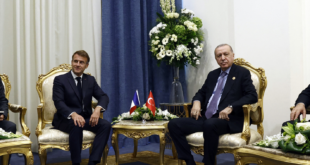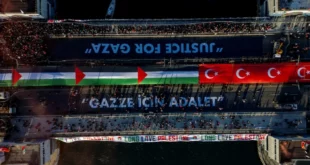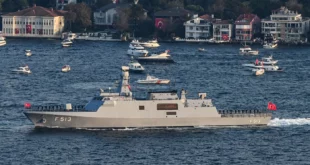TURKEY
After Turkey’s 1980 military coup, the Kurdistan Workers’ Party, or PKK, gained strength in the Southeast, and four years later, the group began its armed attacks. Now, more than 20 years later, the residents of villages in the region still live in fear and wonder what their lives were like before the outlawed terrorist group brought violence to their hometowns.
The first thing Müzeyyen Ulaş heard was gunshots coming from the end of the village. Her children were young, so she took them all to the cowshed round back, hid them under a sofa and then used everything she could to block the door. All the while, the gunshots were coming closer.
This is how Ulaş, 51, mother of nine, recalled the first attack by the outlawed Kurdistan Workers’ Party, or PKK, on her village, Dalbudak in Diyarbakır province, in September 1992.
“The only thing I thought was that we were all going to die. The only uncertain thing was how,” Ulaş said in Kurdish, as she never learned to speak Turkish.
Her family survived the attack, but one village guard – a local villager employed by the state to protect villages and provide intelligence to the military – died and others were injured. With clashes between the PKK and the state escalating in the region, Dalbudak residents began living in constant fear. As many as 40,000 people have died in clashes between the PKK and the military since the PKK launched its armed attacks in 1984.
Although this was the first killing in Dalbudak, its choice as a target by the PKK was a result of a decision by the village elders to join the village guard system in 1987, just two years after it was introduced.
Having lived in constant fear for decades, Dalbudak locals now struggle to remember how it was before the PKK appeared in the region.
Recent history of the PKK
Generations around the country have been born and raised knowing about the PKK’s existence and the continuing death toll it has caused. Still, the history of the PKK is not clear to many people in Turkey. The conflict is such a familiar part of everyday life that most people have accepted this problem as a reality.
The PKK is seen by some as the last in a series of Kurdish uprisings in Turkey’s Southeast dating back to Ottoman times.
Some academics state that the emergence of an ideal of independence among Kurds started after the establishment of the Turkish Republic in 1923. As the new Republic was secular, with its emphasis on the Turkish language and identity, some Kurdish groups in the 1920s and 1930s called for separation in order to build a more conservative and Kurdish state based on clan loyalties. Every uprising was put down by military force.
The PKK’s emergence in the 1970s followed an alternative course. It was born as a Marxist-Leninist Kurdish movement, founded and led by Abdullah Öcalan. In the early 1970s, when he was studying political science at the Ankara University, he was active in leftist movements and his group was known as “Apocular,” or Apo’s followers. Apo is an abbreviation of Abdullah. Apocular was seen as an offshoot of Dev-Genç, a leftist mass youth organization.
Sami Tan, the head of the Istanbul Kurdish Institute, which has specialized in advancing Kurdish language and culture for 17 years, said Öcalan’s group was not the only one that focused on Kurdish rights but in time it became the largest. Tan said there were other Kurdish groups in the 1970s, such as Kawa, Özgürlük Yolu, or Freedom Road, and Rizgari.
After being released from prison, Öcalan left school and went to southeastern Turkey, calling on young people to join him. Tan said that after a relatively large gathering in 1977, the PKK was officially launched in the Fis village in the Lice district of Diyarbakır on Nov. 27, 1978.
The PKK called for an independent state for Kurds, said Tan, adding that it still took six years for the PKK to launch its first armed attack, on Aug. 15, 1984, in the Eruh region of the southeastern province of Siirt.
Effects of 1980 military coup
What made the PKK more powerful than other similar groups was its anticipation of the Sept. 12, 1980, military coup and the fact that it sent most of its members overseas by the time it actually happened, said Tan.
The coup leaders focused on left- and right-wing groups and detained and tortured many of the groups’ members. There is no doubt that many leftists were subjected to ill-treatment and torture during the 1980 coup; however, some believe that Kurdish leftists faced the harshest treatment in the prisons.
Seydi Fırat, a former PKK member who surrendered to the Turkish military in 1999 along with seven others, said many people who spent time at the Diyarbakır prison after the coup were tortured, some killed and some were left permanently disabled.
“The cruel torture and violence done in the Diyarbakır prison after 1980 was nothing like what happened elsewhere in Turkey at that time,” said Fırat, who also served in prison for five and a half years in Ankara after surrendering. “Those who entered the Diyarbakır prison actually entered hell.”
According to Fırat the pressure on the Kurdish prisoners was higher since there was a program that aimed to eliminate the rise of Kurdish identity. In those years, recognizing the existence of Kurds was deemed illegal, along with speaking Kurdish.
Şerafettin Elçi, a deputy for the Republican People’s Party, or CHP, when the coup took place, was sentenced to one year imprisonment for saying, “There are Kurds in Turkey, and I am a Kurd,” according to a book titled “The Kurdish Question and Turkey,” written by academics Kemal Kirişçi and Gareth M. Winrow. Severe repression coupled with bans on anything Kurdish resulted in the PKK emerging stronger from the coup while the other leftist groups were reeling in its wake.
Hope followed by peak in violence
After the start of armed attacks in 1984, the PKK gradually escalated its violence, with the state solely resorting to military operations against it, with Öcalan directing PKK attacks from his base in Syria.
The anti-terrorism law that came into effect in 1991 introduced bans on the Kurdish language and culture and curtailed many rights. Writer İsmail Beşikçi was sentenced to 200 years in prison for violating this law in his publications. Military operations were also widened to include northern Iraq as the PKK had many of its bases there after the First Gulf War.
According to Kirişçi and Winrow, and confirmed by Iraqi President Jalal Talabani, who was the leader of the Patriotic Union of Kurdistan, or PUK, in northern Iraq at the time, President Turgut Özal attempted to establish a dialogue with the PKK’s leaders in 1991.
Negotiating with the PKK has always been a taboo for the Turkish military and governments.
He later said allowing a Kurdish language television channel would ease the problem. Özal even stated that a federation system could be discussed as a solution. Özal’s efforts are mostly referred to when Turkey came closest to a solution to the Kurdish problem. The PKK’s response was to announce a cease-fire on March 20, 1993. But Özal’s death from a heart attack on April 17, 1993, ground to a halt all such efforts. The death shocked the country and ended the peaceful atmosphere.
On May 24, 1993, 33 soldiers were killed on a road between the eastern provinces of Elazığ and Bingöl by a controversial PKK attack because the organization did not openly take responsibility for it. It was criticized that these soldiers had no weapons with them and there was no additional unit to protect them. Soldiers had completed their military service and were discharged from the military when they were attacked.
The positive atmosphere in the political arena changed after that, too. In the 1991 general elections, a pro-Kurdish party, the People’s Labor Party, or HEP, entered the elections under the Social Democratic People’s Party, or SHP, ticket to pass the 10 percent threshold and some Kurdish politicians, such as Ahmet Türk, the current head of Democratic Social Party, or DTP, Leyla Zana, Hatip Dicle and Sırrı Sakık, were elected to Parliament.
After Zana attempted to take her parliamentary oath in Kurdish, she and three other deputies had their immunities revoked. All four were sentenced to lengthy prison terms, only to be released in 2004 after significant European Union pressure.
On June 16, 1994, HEP was shut down by the Constitutional Court for its links to the PKK.
The escalation of the conflict in the mid-1990s was also accompanied by the forced evacuation of thousands of villages in the east and the Southeast for security reasons, with many internal refugees migrating to Diyarbakır.
The focus of successive governments on Turkey’s EU membership talks in the late 1990s resulted in the lifting of some bans on Kurdish. Legal amendments to lift restrictions on the education and broadcasting in Kurdish were initiated during this period. Yet the capture of Öcalan in 1999 represented the real turning point.
In 2004, the Justice and Development Party, or AKP, government passed a law that allowed those who had suffered material loss during the state’s fight with the PKK to demand compensation. Only in 2005, 69,832 people applied for compensation.
Asri Uçak, 40, son of Rifat Uçak, who was killed in the Dalbudak village 17 years ago in the PKK attack, starts crying when he suddenly remembers his father from one of his dreams. “He [Rifat Uçak] was sitting at the top in a crowded room in my dream. That means he rests in peace on the other side,” said Uçak, drying his eyes. Despite his pain, he believes that peace will eventually come.
Nezir Ç., who declined to give his surname, from Salihli village, said he was tortured when he was 18 because his uncle had joined the PKK. He is also hopeful about the future: “These people are looking forward to peace. Everybody here wants peace because they are all sick and tired of this conflict.”
Öcalan’s capture
After Turkey threatened war with Syria over the PKK late in 1998, Öcalan was told to leave Syria, and after months on the run, he was captured in Nairobi, Kenya, on Feb. 16, 1999. After his trial, he was sentenced to life imprisonment and is kept on İmralı Island in the Marmara Sea.
As in 1993, Öcalan’s capture was seen as an opportunity. That year, two groups of PKK members, one group based in Europe and the other in southeastern Turkey and Iraq, surrendered to the Turkish authorities.
Seydi Fırat was a member of the latter group. He said that though the state always called on PKK members disarm and surrender, the state did not provide them with viable options on what happened to them. “They were calling us and we came,” said Fırat. “We gave letters to higher authorities such as the president. Our demands were ignored.”
He said some PKK members who came from Europe and had never been involved in armed attacks were sentenced to 11 years. “They are still in prison, and this does not encourage others.”
According to Fırat, Turkey missed the opportunity created by Öcalan’s capture. He believes the authorities’ opinion on the issue was, “When the leader is captured, the PKK will come to an end.” But it did not. Öcalan’s capture resulted in infighting within the PKK and the consequent confusion within the group was the reason behind its comparably quiet stance for the next four years, after which the clashes escalated once again but never back to the height of the mid-1990s.
 Eurasia Press & News
Eurasia Press & News


